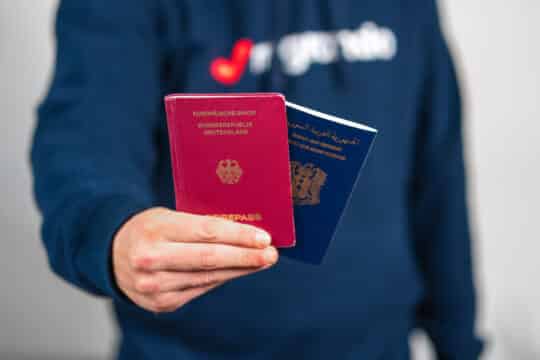With Naturalization you will finally receive German citizenship and a German passport. In this comprehensive article, we explain everything you need to know about Naturalization . We will show you what advantages you have with Naturalization and what requirements you need to meet. The Naturalization is a long and complicated process. But with our help, you will find out how to finally become a German citizen!
What is the Naturalization?
The Naturalization enables you to obtain German citizenship and a German passport. As soon as you are naturalized, you are legally 100% equivalent to a German. You have all the rights and obligations of a German. From the time of Naturalization you can invoke basic rights like any German. You can no longer be deported from the moment you Naturalization . You will never have to visit Foreigners' office again, you will never need a work permit again and you can bring your family to Germany immediately.
Why do you have all these rights according to Naturalization ?
Because from that moment on you are a German citizen. Many foreigners already have the goal of becoming German at some point from the moment they enter Germany. The fewer legal mistakes you make from the moment you enter the country, the faster you can be naturalized. You will not only be treated as a German within Germany, but will also enjoy the benefits of German citizenship abroad. On the one hand, it is much easier for you as a German to travel abroad and on the other hand, you will never again have problems entering Germany. There are many temporary and permanent residence rights in Germany, but none offer as many advantages as Naturalization. After Naturalization you no longer have a residence status, but are a holder of German citizenship.
Can't get an appointment, having problems with Foreigners' office or your application has been rejected? We are sure that we can help you too!




How can I be naturalized in Germany?
There are many ways to become naturalized in Germany. Section 3 of the Citizenship Act (StAG) regulates how you can become naturalized. You can become German by:
Application for naturalization
The most relevant and most common option is to apply for naturalization. The legal basis for this can be found in particular in §§ 8 - 16, 40b and 40c StAG. When you apply to Naturalization , the competent authority will check a large number of requirements and documents. Even though it is the most common option at Naturalization , it is also the most difficult to become naturalized through an application.
If you are interested in German citizenship, you will most likely have to apply for naturalization. On migrando.de you will find lots of valuable tips on how to solve your problems with Naturalization .
Birth in Germany
Many people think that when you are born in Germany, you also receive German citizenship. Unfortunately, this is not always true. In contrast to the USA, where the so-called descent principle applies, you do not automatically become German at birth in Germany. In principle, you automatically become German at birth if one of your parents already has German citizenship (§ 4 StAG). There are other ways to become German by birth (e.g. as a foundling).
In other cases
There are other ways to become German. These are rare exceptions, but you should be aware of them. After all, it cannot be ruled out that an exception applies to you. It is a pity if you could be naturalized but do not know it. There are other ways to obtain German citizenship according to:
- § Section 4 (1) StAG
If you were born in Germany and at least one of your parents is German. - § Section 4 (2) StAG
If you are a foundling. Foundlings are children abandoned by their parents who have been found by strangers. - § Section 4 (3) StAG
If you were born in Germany and at least one parent has been legally resident in Germany for 8 years. - § Section 5 (1) no. 1 StAG
If you were born in Germany and at least one of your parents is German, but you did not receive German citizenship by mistake. - § Section 5 (1) no. 2 StAG
If you were born in Germany but lost your citizenship because the child's mother lost her German citizenship through marriage to a foreigner. - § Section 5 (1) no. 3 StAG
You were once German, but your German citizenship was revoked at your parents' request. Because you were once German, you can obtain German citizenship again in this case. - § Section 5 para. 1 no. 4 StAG
In addition, there are further, but exceptional special cases, Section 5 para. 1 nos. 1-3 StAG - § Section 6 StAG
If you are adopted by a German. - § Section 15 (1) or (2) of the Federal Expellees Act
If you were expelled or expelled from Germany. - Art. 2 of the Act on the Avoidance of Statelessness
As a stateless person if you have been living legally in Germany for 5 years and are under 21 years of age. - § Section 21 of the Act on the Legal Status of Homeless Foreigners in the Federal Territory
As a homeless person if you have been living legally in Germany for 7 years.

When can you apply for Naturalization in Germany?
There are many ways to become a naturalized citizen. You can naturalize for the first time after 3 years under the Citizenship Act. It is most likely that you will be naturalized after 6-8 years of legal residence in Germany. You should definitely know when you meet the requirements for Naturalization , as you should apply for naturalization about 1 year in advance.
The naturalization procedure is very complicated because Germany wants to rule out the possibility of you being wrongly naturalized without an extensive check. Due to the complexity, the naturalization procedure usually takes 1 to 2 years without a lawyer. Due to the wave of refugees since 2015, more and more foreigners will apply for naturalization from 2022 onwards. So far, around 100,000 people have been naturalized each year. Within the next 4 years, it can be assumed that a total of 1 million people will be naturalized, which means that the responsible authorities will be enormously overloaded. Don't wait, get naturalized as soon as possible.
***Statista
The advantages of the Naturalization
After Naturalization you no longer need a right of residence. You are German and not a foreigner! You will also receive a German national passport. This results in many valuable advantages:
- You are a fully-fledged German
After Naturalization you have all the rights and obligations of a German. - Deportations abroad are excluded
As you are a German citizen, you can no longer be deported. - Simplified family reunification
Naturalization will make it much easier for you to bring your family to Germany. - At last you can take out loans even more easily
Loans enable you to make larger purchases, e.g. to buy a house or a condominium. - Enter and leave Germany freely whenever you want
Finally, you can travel to any country in the world, including your home country. - Traveling abroad for an indefinite period
You are finally allowed to travel abroad for more than 6 months without the consent of Foreigners' office. - Emigrate abroad without losing your German citizenship
As a German, you can emigrate to any country in the world without losing your German citizenship. - Working legally in Germany and abroad
You can change jobs or set up a company without any problems. - German citizenship is not tied to any particular purpose
According to Naturalization , German citizenship does not simply cease to exist when studies, training, an employment contract or marriage ends. - Planning security for the future
Your center of life can no longer be terminated by third parties. Once naturalized, always naturalized! - No more appointments at Foreigners' office
You will no longer have to go to Foreigners' office after Naturalization . As a German citizen, Foreigners' office is no longer responsible for you. - As a German citizen, you are also a citizen of the European Union
You not only have all the rights of a German in Germany, but also all the rights and obligations of an EU citizen under EU law. - Once a German, always a German
German citizenship can no longer be revoked in Germany.
When do I get German citizenship?
Prerequisite Naturalization
As already explained, there are numerous ways to become naturalized. Below we explain the conditions under which you can usually be naturalized. In order to be naturalized, you must meet many requirements. Which requirements you have to fulfill depends on which legal basis applies to you. In principle, the requirements for Naturalization are based on the Citizenship Act (StAG). If no special regulations apply to you, you will be naturalized at the earliest after 8 years in accordance with § 10 StAG if you meet all the requirements.
Naturalization after 8 years (§ 10 Citizenship Act)
You can read the legal requirements directly in § 10 StAG. Since the requirements are sometimes very complicated for a layperson to understand, we have summarized the most important requirements for you in simplified form below:
- You must have been living legally in Germany for 8 years.
- You must be financially integrated, i.e. secure your livelihood from your own resources.
- You must have made (partial) provision for your old age. Exception: you are a pupil, trainee or student.
- In principle, you must not have a criminal record, i.e. you must not have been sentenced to fines of more than 90 daily rates or to prison sentences of more than 3 months...
- You must be culturally integrated, i.e. have a German language certificate (B1) and have completed an integration course.
- You must have a valid passport or passport replacement.
We have deliberately not listed all the requirements with all the details and special exceptions here. Due to the complexity, it is very difficult to understand under which conditions you can be naturalized. To help you find out as quickly as possible whether you can be naturalized, we have created our free test for you at Naturalization due to the enormous complexity.
To find out immediately whether you are eligible for Naturalization , simply take our free test now.
What is the quickest way to obtain Naturalization?
In addition to Naturalization after 8 years, there are many other ways to obtain German citizenship. If there is not one of the rare exceptions in which you become German without applying for naturalization, there are various ways to apply for Naturalization . The quickest way to Naturalization is after 3 years of legal residence. Below, we explain the different eligibility criteria and the most important requirements.
Naturalization after just 3 years
If you have a German spouse, you can be naturalized very quickly if you meet the following requirements according to § 9 StAG.
- 3 years legal residence in Germany
- Marriage or registered civil partnership has existed for 2 years
- The family must be able to support itself from its own resources
- You must not have a criminal record, i.e. you must not have been sentenced to fines of more than 90 daily rates or to prison sentences of more than 3 months
- You must have a valid passport or passport replacement
Naturalization after just 6 years
You also have the option of obtaining Naturalization after just 6 years. For this, you must prove that you are particularly well integrated in accordance with § 10 Para. 3 Sentence 2 StAG. In particular, you must meet the following requirements:
- You must have been living legally in Germany for 6 years .
- You must be financially integrated, i.e. secure your livelihood from your own resources.
- You must have made (partial) provision for your old age. Exception: you are a pupil, trainee or student
- You must not have a criminal record, i.e. you must not have been sentenced to fines of more than 90 daily rates or to prison sentences of more than 3 months
- You must have a valid passport or passport replacement.
- They must be particularly well integrated
For the Naturalization after 6 years, all normal requirements according to § 10 StAG must be met. In addition, you must be particularly well integrated. The easiest way to prove this is if you have at least a B2 language certificate. However, other special proof of integration is also possible. These can be, for example, the following certificates:
- particularly good academic performance
- particularly good performance during the training
- particularly good performance during the course of study
- Voluntary activities in non-profit organizations or associations
Naturalization after only 7 years
Furthermore, it is possible to be naturalized after 7 years and not only after 8 years. To do this, you must prove that you have completed an integration course in accordance with § 10 Para. 3 Sentence 1 StAG. In particular, you must fulfill the following requirements:
- You must have been living legally in Germany for 7 years.
- You must be financially integrated, i.e. secure your livelihood from your own resources.
- You must have made (partial) provision for your old age. Exception: you are a pupil, trainee or student
- You must not have a criminal record, i.e. you must not have been sentenced to fines of more than 90 daily rates or to prison sentences of more than 3 months
- You must have a valid passport or passport replacement.
- You must have passed an integration course
***Table

How can children be naturalized?
In contrast to permanent residence rights, which are only possible from the age of 16, children can be naturalized at birth. There are numerous options for children Naturalization. First, we explain the normal Naturalization of children. You will find further options for naturalizing children in Germany under the following exceptions.
What applies to children under the age of 16?
Children who have not yet reached the age of 16 can also be naturalized. However, the legal representative, usually the parents, must submit the application on behalf of the children.
What applies to children over the age of 16?
Children who have reached the age of 16 can submit a naturalization application to the competent authority independently in the same way as an adult in accordance with § 10 StAG. This means that every minor applicant for naturalization from the age of 16 must complete a separate application form. In principle, the same requirements apply as for adults.
However, the following requirements do not have to be met or only partially met, regardless of whether the child is younger or older than 16:
Livelihood
The requirements for children are significantly less stringent, as they are generally unable to secure their own livelihood from their own resources. As a rule, it is sufficient if the child is not responsible for the fact that their livelihood is not secured.
Pension insurance contributions
In principle, it can be assumed that underage children are exempt, as they have not had the opportunity to pay into the German pension insurance scheme due to their age.
Language certificates
For children, it is sufficient if sufficient oral and written language skills can be demonstrated. This does not necessarily require the presentation of a language certificate (B1). It is also sufficient:
- For underage children who have not yet been able to obtain a school-leaving certificate due to their age (younger than 16 years), a school-leaving certificate does not have to be submitted. It is sufficient if the minor has been promoted to the next higher class for four consecutive years and has achieved a grade of at least "sufficient" (4) in German.
- A secondary school leaving certificate or an equivalent German school leaving certificate and at least a grade of "sufficient" (4) in German.
- Promotion to the 10th grade of a secondary school (Gymnasium, Realschule, Gesamtschule) and a minimum grade of "sufficient" (4) in German.
- The successful completion of a university degree or university of applied sciences degree at a German-speaking faculty. The same also applies in the case of successful completion of vocational training, whereby retraining measures are not sufficient. Since it can only be assumed in very few exceptional cases that such a qualification will be obtained before the 18th birthday, the requirement does not generally help minors.
Integration test
An integration test is generally not necessary if the minor:
- can provide proof of a German school-leaving qualification or
- has completed German vocational training or
- has completed a German course of study or
- promoted to the next higher class for at least four consecutive years
was.
How do I find out when I can receive the Naturalization ?
In detail, the requirements vary greatly depending on the basis of entitlement that applies to you. Depending on the basis of entitlement, you can sometimes be naturalized after just 3 years. To make it easier to understand, we have created an overview that shows you which requirements you must meet depending on the relevant basis of entitlement. We have only included the most important entitlement bases in the chart.
Have you been waiting many months or can't get an appointment?
Special regulations and other exceptions
You have now learned that there are many different eligibility criteria for Naturalization . According to some eligibility criteria, you can be naturalized relatively quickly (3 years), according to other eligibility criteria, Naturalization takes 6-8 years. Furthermore, there are many other regulations that simplify some of the requirements in the aforementioned eligibility criteria or even remove them altogether. The most important exceptions and special regulations are
Exemptions for sick, elderly and disabled people
Section 10 (6) StAG exempts you from certain requirements if you can prove that you are disadvantaged because of a physical, mental or psychological illness or because of a disability or age. In this case, you do not have to fulfill the following requirements:
- No presentation of a language certificate
- No submission of an integration test "Living in Germany"
Exemption for spouses, life partners and minor children
In addition, spouses, life partners and minor children can also be naturalized under simpler conditions. This is regulated in § 10 para. 2 StAG. One exception is particularly important in this context. For the spouse, life partner and minor children, the following requirement must only be fulfilled by the applicant, i.e. not by the spouse, life partner and minor children:
- You do not have to have been legally resident in Germany for 8 years.
Exemption for pupils, trainees and students
There is also a very interesting exemption for pupils, students and trainees. This exception is not explicitly stated in the law. However, § 10 Para. 1 Sentence 1 No. 3 StAG stipulates that state benefits are not harmful if they are not attributable to you. The following therefore applies to pupils, trainees and students at Naturalization :
- No pension insurance contributions are required
- Pupils, students and trainees do not need to have an income to support themselves.
Free test
You don't know whether and under what conditions you can obtain Naturalization ? Under which regulation do you now have to apply for Naturalization ? We have a solution for that! We recommend that you take our free test at this point. If you are eligible for Naturalization , you will receive a free consultation after the test, in which we will examine in detail how you can obtain German citizenship as quickly and easily as possible and what requirements you need to fulfill.
When will I receive the Settlement permit?
Application for Naturalization: How can I obtain Naturalization immediately?
If you meet the requirements, extensive legal steps are necessary for you to be naturalized.
Naturalization - Requirements from 2022
As laws and regulations change at any time, we explain how you can become a naturalized citizen from 2022. We recommend that our clients start Naturalization as soon as possible if the requirements are currently met. Changes to the law may mean that you no longer meet the requirements at any time in the future. It would be a shame if you currently meet the requirements and can no longer obtain Naturalization after a change in the law. It is necessary to determine which legal basis for entitlement is applicable in your case, i.e. the conditions under which you can be naturalized as quickly as possible. The problem with this is that the competent authority may not choose the correct legal basis, which can lead to problems or a rejection for you.
Application Naturalization
The first step is to submit an application for naturalization to the competent authority. Please ensure that you receive written proof of receipt of the application from the competent authority.
Written application for Naturalization
Please make sure that you submit your application for naturalization in writing. You should also make absolutely sure that you obtain written confirmation from the competent authority as to when the naturalization application was received. On the one hand, this will ensure that you have proof of the written naturalization application. If the competent authority takes more than 3 months to process your application, you can oblige the competent authority to process your application in the competent administrative court at Lawsuit for failure of act .
Application for Naturalization form from 2022
Some authorities have published the naturalization application on their homepage.
Unfortunately, the application procedures in the many hundreds of "naturalization authorities" vary greatly. This means that the documents requested by the competent authority are also very different. In the first step, enter the name of the authority at www.google.com and search for the following document:
- Naturalization Application PDF
Unfortunately, the naturalization documents are also not uniformly named by the respective authorities. The most common names are
- Application Naturalization PDF
- Naturalization form PDF
- Form Naturalization PDF
You should first search for and download the application on the Internet. We recommend that you read the application in detail before starting the application process, as this will tell you which documents you need. If the naturalization application is not available online, make an appointment at the relevant authority and have the application handed over to you.
Online application Naturalization
In addition, some authorities in Germany now offer the option of processing the naturalization application online. If the authority responsible for you offers this, you should definitely use this service. This has the great advantage that you can prove that you have submitted the application. In addition, the processing times are usually shorter in this case.

Submit documents for Naturalization
Once you have submitted your application, you must regularly submit copies and/or originals of numerous documents. Which documents are required in detail depends largely on the basis of which entitlement you can or must apply for Naturalization . As a rule, the following documents are required:
- completed application for naturalization
- residence permit
- Employment contract
- Wage statements
- Employer confirmation
- Tax assessment notice, business analysis and certificate from the tax consultant
- Training contract
- Certificate of enrollment
- School, intermediate and final certificates
- Pension notifications from the German pension insurance
- Language certificate
- Test "Living in Germany"
- Rental agreement
- Landlord confirmation
- Proof of rent payment (bank statement)
- Certificate of good conduct
- Certificate that you do not receive any benefits from the state (social assistance, ALG I and II, housing benefit)
- Simple and extended registration certificate
- Passport or passport replacement
- Proof of identity such as birth certificate, family book, register entry
What is a declaration of loyalty?
As part of Naturalization , you must also submit a so-called declaration of loyalty. This is a document in which you declare your commitment to the free democratic basic order. In principle, all that is required is a signature. In practice, this document is rarely a hurdle in the naturalization process.
In addition, submitting the complete and correct documents is the biggest hurdle at which many applicants fail without a lawyer. In our experience, many foreigners in Germany do not receive the Naturalization simply because they are unable to submit all the documents in full to the competent authority. It is particularly problematic in this context if the processing times are very long. In this case, updated documents are requested again and again. For example, if you have submitted all the documents and the documents are not checked until 3-9 months later, the following documents will be requested again:
- Employment contract
- Wage statements
- Employer confirmation
- Tax assessment notice, business analysis and certificate from the tax consultant
- current training contract
- current enrollment certificate
- Pension notifications from the German pension insurance
- Rental agreement
- Landlord confirmation
- Proof of rent payment (bank statement)
- Certificate of good conduct
- Certificate that you do not receive any benefits from the state (social assistance, ALG I and II, housing benefit)
- Simple and extended registration certificate
This leads to enormous frustration for many applicants because the same documents have to be submitted repeatedly. This is why it is so important not to make any mistakes when submitting the application and documents for the first time. All information in the application must be complete. The documents must also be complete and clearly legible. After submitting the application, you should press for an appointment as soon as possible, at the latest after 3 months, so that you at least have a chance of completing the application procedure promptly without a lawyer.
What does the decision on the naturalization application depend on?
Whether you are naturalized depends on whether you meet all the requirements according to the respective basis of entitlement under the Citizenship Act. You can only be naturalized if all requirements are met and all documents have been submitted completely and promptly.
Unfortunately, the problem in this context is that not all requirements have been clearly clarified by the legislator. In a number of regulations, the requirements are open to interpretation. In the context of Naturalization , for example, a prognosis is almost always made on the question of whether your livelihood is secured in accordance with § 10 Para. 1 No. 3 StAG. Whether and under what conditions your livelihood is secured depends on many factors. At this point, it is regularly difficult for the applicant to assess whether the competent authority acted lawfully or unlawfully in the event of a rejection.
If you need assistance, we will be happy to help you with your naturalization procedure.
We enforce your rights!
What biometric data do you have to provide?
Once your application and all documents have been checked and there are no further legal or factual obstacles to Naturalization , you will receive an appointment to submit your biometric data. You should make absolutely sure that this appointment takes place as soon as possible after the examination has been completed, otherwise the examination procedure will start all over again, at least in part. We recommend that you press for an appointment within 4 weeks of completing the examination. However, it regularly happens that this appointment does not take place until 3-12 months after the final examination. This delay can be avoided by contacting us. During this appointment, you will need to provide your fingerprints and a personal signature. If you have not yet submitted a biometric passport photo as part of the written application, you must always bring this with you to the appointment.
a) Naturalization Processing time
In our experience, the naturalization procedure takes between 6 - 24 months without a lawyer. We regularly find that the length of the procedure is shorter with smaller authorities and longer with larger authorities (e.g. Berlin).
The application procedure with Migrando currently takes between 3 and 7 months. The background to this is that the lawyer can directly file an Lawsuit for failure of act in the event of a delay in processing.
b) How long does it take to print the ID documents?
After the naturalization application has been approved, only the German identity card and the German national passport need to be produced by the Bundesdruckerei. In our experience, this takes approx. 4-8 weeks.
What does the naturalization procedure cost?
a) What fee do I have to pay?
The fees for the naturalization procedure are regulated by law in § 38 StAG. The following fees apply:
- Naturalization certificate for adults 255,00 Euro
- Naturalization certificate for underage children 51,00 Euro
If the application is withdrawn before the naturalization certificate is issued, costs of 25.00 euros - 255.00 euros are usually incurred.
b) Who is exempt from the fee
It is also possible to be exempted from the fees in accordance with § 38 para. 3, 4 StAG. However, the normal applicant cannot usually be exempted from the fees.
Naturalization application: Our conclusion
Experience shows that the successful Naturalization naturalization process is sometimes very complicated. Based on the statistics published by Statista, we assume that the actual naturalization rate would be around 30% higher if the naturalization procedure were not so complicated or if the applicant carried out the naturalization procedure with an experienced lawyer.
Never again appointments in the Foreigners' office
Your application to Naturalization rejected
Unfortunately, it is very common for naturalization applications to be rejected. According to our estimates, around 50% of all rejections are unjustified. Therefore, in the event of a rejection, you should always check whether you are entitled to Naturalization . The quickest way to find out whether you can be naturalized is to take our free test.
If your application has been rejected, you still have a total of two options for obtaining the Naturalization .
Appeal against the rejection notice in the naturalization procedure
On the one hand, you can lodge an objection or appeal against the rejection notice from the competent authority within the deadline. Which legal remedy is the right one depends on the federal state in which you applied for Naturalization . In some federal states, the legality of the naturalization decision can be reviewed in the objection procedure before the objection authority. In other federal states, you must take legal action directly before the competent administrative court. You can find out which legal remedy is the right one at the end of the rejection notice. In any case, pay attention to the deadline in the rejection notice. Appeals lodged after the deadline are inadmissible.
New application for the issue of the Naturalization
On the other hand, you have the option of simply applying for naturalization again. However, there are a few things you should bear in mind. It is problematic insofar as you generally submit the application to the same authority, possibly even to the same processor. This means that the same person will decide on your naturalization application. In such cases, it can be assumed that the same officer will reject your application again. If you do not seek legal assistance from a lawyer, you have the option of moving to another district. In this case, a different authority will be responsible, which increases the likelihood that your naturalization application will be approved. Of course, only if all requirements are met.
Our recommendation
If you have received a rejection notice from the competent authority, you should definitely have it checked whether you meet all the requirements for being granted German citizenship. Simply take our free test and find out whether you are eligible for Naturalization .
If you receive a positive test result, you can arrange a free consultation with us. During the phone call, one of our employees will first check whether your information was correct and then inform you whether you meet all the requirements. If you then decide to instruct our lawyers, the lawyer will check whether it is better to lodge an objection or a complaint or whether it would be quicker to submit a new application directly.
10 reasons why the Naturalization was rejected
Even if you supposedly meet all the requirements, authorities in Germany wrongly reject justified applications for naturalization. The reason for this is that the authorities do not check the application properly or you have not provided all the necessary information correctly and completely. It is also possible that the competent authority is examining the wrong legal basis in your case. The 10 most common reasons why naturalization applications are wrongly rejected are
- Pension insurance contributions are wrongly requested or incorrectly calculated.
- Your stay times are calculated incorrectly.
- Your income is calculated incorrectly.
- Child benefit and child benefit allowance are wrongly included in the calculation of living expenses.
- Students must provide proof of income and pension insurance payments despite statutory exemption.
- Trainees must provide proof of income and pension insurance payments despite statutory exemption.
- The competent authority applies the wrong basis for the claim.
- In the case of discretionary naturalization, integration efforts are considered irrelevant.
- The application is not processed or not decided due to Corona.
- The application is rejected because you have received unemployment benefit in the last 24 months.
Do you have to give up your old citizenship at Naturalization ?
This issue is very complicated and depends on many factors. In particular, the question depends on the following factors:
- Current citizenship
- Age
- Reasons for residence in Germany
- Basis of entitlement according to which you wish to obtain German citizenship
- and many more
As a rule, you will have to give up your old citizenship
At Naturalization , you generally have to give up your previous citizenship before Naturalization . The decisive factor is that the old citizenship is renounced as part of the naturalization procedure. Germany is still a country that generally does not want multiple nationalities.
However, there are many exceptions to the principle that you only have German citizenship after Naturalization .
When do you not have to give up your old nationality?
If you want to know for sure whether you will retain your old nationality in the event of Naturalization , an individual case-by-case assessment is necessary in each case. The most relevant reasons why you do not have to give up your old nationality are usually
- You have several nationalities from birth
- You are an EU, Swiss or Israeli citizen
- You belong to a particularly vulnerable group (persons entitled to asylum, recognized refugees, etc.)
- Your country of origin does not allow you to give up your old nationality:
- Afghanistan, Algeria, Angola, Argentina, Brazil, Bolivia, Costa Rica, Cuba, Dominican Republic, Ecuador, Eritrea, Guatemala, Honduras, Iran, Lebanon, Maldives, Morocco, Mexico, Nicaragua, Nigeria, Panama, Syria, Thailand, Tunisia and Uruguay.
- The reason for this is that your application is not accepted or your country of origin does not provide the necessary forms or no decision has been made on your complete application for more than 2 years.
- Giving up your old nationality is unreasonable for you
- It is currently not possible to give up your old nationality
- You have Israeli citizenship
How can the Naturalization be dropped again?
If I have made it as a foreigner and have finally been naturalized, the question arises as to whether I can lose my German citizenship again? The answer to this is: NO!
After Naturalization there is no longer any risk that you could lose your German citizenship. In contrast to residence rights, which can actually be revoked or taken back, there is no such risk once you have obtained German citizenship. Even if you commit a serious criminal offense, you will remain German. After Naturalization you have all the rights and obligations of a German citizen for the rest of your life because you are a German citizen.
Do you still have questions?
FAQ - The most important questions and answers about Naturalization
In contrast to some other countries in the world, you do not automatically receive German citizenship when you are born in Germany. There must be additional requirements for you or your children to become German at birth.
This question is very complicated and cannot be answered in a few sentences. Basically, there are various ways in which you can obtain German citizenship. As part of the normal Naturalization process, you can generally be naturalized after 6-8 years. However, there are many positive and negative exceptions to this.
After Naturalization you are German! Even if you are not a "classic German", whatever that means, it is no longer a particularly good right of residence. Once you have been granted German citizenship, you will keep it forever.
Once you have been naturalized, you will receive a German passport in addition to your identity card. You can use this to travel to all countries.
If you have a criminal record, the question of whether you can be naturalized depends on when and what crimes you have committed. In any case, previous convictions are unproblematic if you have been sentenced to fines of less than 91 daily rates or suspended sentences of less than 3 months. In the case of sentences that exceed this, it must be checked on a case-by-case basis whether and when Naturalization is possible (again).
In principle, you can be naturalized as a pupil, trainee or student. Even if it is generally necessary to secure your own livelihood, there are some exceptions for pupils, trainees and students, but only if all other requirements for Naturalization are met.
Yes, every German has the right to become self-employed. Issues relating to immigration law no longer play a role after Naturalization . Even if the topic of self-employment can be somewhat more complicated, in case of doubt you only need an idea in the first steps to put your approach into practice.










